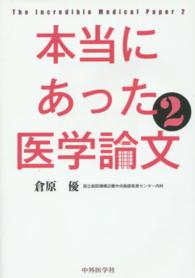- ホーム
- > 洋書
- > 英文書
- > Literary Criticism
Full Description
Undoubtedly one of Africa's most influential first generation of writers and filmmakers, Ousmane Sembene's creative works of fiction as well as his films have been the subject of a considerable number of scholarly articles. The schemas of reading applied to Sembene's oeuvre (novels, short stories and films) have, in the main, focused either on his militant posture against colonialism, his disenchantment with African leadership, or his infatuation with documenting the past in an attempt to present a balanced and nuanced view of African history. While these studies, unquestionably contribute to a better understanding of his works, they collectively ignore Sembene's relentless preoccupation with culture in his entire career as a writer and filmmaker. The collection of essays in Sembene and the Politics of Culture sets out to fill that gap as the contributors at once foreground Sembene's fixation on the centrality of culture in the articulation of the discourse of national consciousness and reevaluate his intellectual and artistic legacy within an overarching framework of African liberation.
The contributors critically reassess the ideological underpinnings of Sembene's thoughts, his role as one of the foundational pillars of African cultural production, and his relevance in current discourses of nationhood. They do so through a wide variety of interdisciplinary approaches that draw on linguistics, feminist theory, film theory, historiography, Marxist criticism, psychoanalysis and a host of other approaches that give novel insights in the critical analysis of the works under study. In the part entitled "Testimonies," a collection of conversations with people who worked closely with Sembene, each of the interlocutors provide illuminating insights into the man's life and work. The variety of themes and critical approaches in this critical anthology will certainly be of interest not only to students and scholars of African literature and cinema at various levels of intellectual and cultural sophistication but also anyone interested in the analysis of the nexus between power, culture, and the discourse of liberation.
Contents
Table of Contents
Introduction: Cultural Politics in Senegal: A Quest for Relevance, by Lifongo Vetinde
Part One: Culture and Development
Chapter One: Sembene, Senghor and Competing Notions of Culture and Development at the 1966 Festival Mondial des Arts Nègres de Dakar, by David Murphy
Chapter Two: Sembène and the Aesthetics of Senghorian Négritude, by Lifongo Vetinde
Chapter Three: Representations of Islam and the question of Identity in Ousmane Sembene's Ceddo, by Cherif Correa
Part Two: Discourses
Chapter Four: A Twice-Told Tale: The Post-colonial Allegory of La Noire de ...(1966) and Faat Kine (2000), by Dayna Oscherwitz
Chapter Five: Bringing the Rain Indoors: Rereading the National Allegory in Ousmane Sembene's Xala, by Mathew H. Brown
Chapter Six: Women in Sembène's Films: Spatial Reconfigurations and Cultural Meanings, by Moussa Sow
Chapter Seven: Why Does Diouana Die? Facing History, Migration and Trauma in Black Girl, by Lyell Davis
Part Three: Language and Aesthetics
Chapter Eight: La







